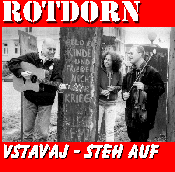Vstavaj - Steh auf:

erschien im August 2004
Titel:
|
|
The Foggy Dew
(Trad. Irish Revolution Song, 1916 Easter Rising)
| I |
As down the glen one Easter morn, to a city fair rode I.
There armed lines of marching men in squadrons passed me by.
No pipe did hum, no battle drum did sound its loud tattoo.
But the Angelus bell o`er the Liffey swell, rang out through the foggy dew.
|
| II |
Right proudly high in Dublin town they hung out the flag of war.
It was better to die `neath an Irish sky, than at Sulva or Sud el Bar.
And from the plains of Royal Meath strong men came hurrying through,
while Brittania's Huns, with their great big guns, sailed in through the foggy dew.
|
| III |
It was England bade our Wild Geese go, that small nations might be free,
but their lonely graves are by Sulva's waves on the fringes of the great North Sea.
Oh had they died by Pearse's side or fought with Cathal Brugha.
Their names we keep, where the Fenians sleep, 'Neath the shroud of the foggy dew.
|
| IV |
But the bravest fell and the Requiem bell rang mournfully and clear,
for those who died that Easter tide, in the springtime of the year:
While the world did gaze with deep amaze, at those fearless men but few,
who bore that fight, that freedoms light might shine through the foggy dew.
|
| V |
As back to the glen I rode again my heart with grief was sore.
For that gallant band of fighting men I never would see more.
And to and fro in my grief I go, I think gallant comrades of you,
for slavery fled oh glorious dead when you fell in the foggy dew.
|
|
|
Dieses Lied besingt den legendären Osteraufstand 1916 in Irland (Easter Rising). In diesem Jahr besetzten
Freiheitskämpfer der IRA das Hauptpostamt in Dublin und proklamierten die freie Republik Irland, ein Land, das jahrhundertelang
unter der britischen Vorherrschaft litt. Nach einigen Tagen mussten die Rebellen angesichts der Übermacht der Briten aufgeben.
Sie wurden wenige Tage später trotz internationaler Gnadengesuche standrechtlich erschossen. |
|